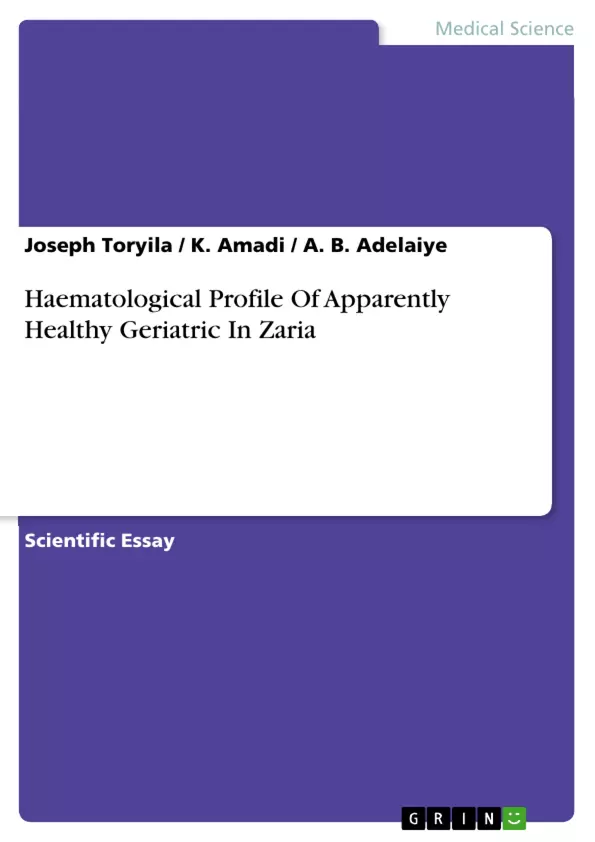The haematological profile of four hundred (400) apparently health adult Nigerian residing in Zaria, aged 60-85years old were studied and compared with young adults control 20-30 years in order to establish haematological reference values for the aged men and women. Haematocrit, haemoglobin, red blood cell counts, white blood cell counts, differential white blood cell counts, platelet counts, mean cell volume, means cell haemoglobin and mean cell Haemoglobin concentration were analyzed using cell Haematology analyzer (CELL Dyn 4000) and erythrocyte sedimentation rate (ESR) was determined using westergreen method. The mean value of RBC count, Hb, Hct, WBC count, Platelet count and neutrophils were significantly lower in apparently healthy elderly male and female (P<0.001) than in control. All hematological parameters estimated showed sex and age related differences except basophils and MCHC. ESR showed sex and age differences with higher mean value in apparently healthy elderly females. A slight decrease in the mean values of neutrophils was observed in both sexes and ages. Mean value of MCV, MCH, lymphocytes, eosinophils and monocytes were significantly increased in the elderly males and females compared to those in the young adult control (P<0.001). Based on physiological variation (age and sex) the reference value for fourteen (14) haematological constituents of blood have been estimated, in order to provide medically reliable evaluation of haematological values in the elderly males and females. The use of seperates reference haematological values for the aged adults is hereby advocated; further study to ascertain the actual causes of low haemalogical value in the elderly is hereby recommended.
Inhaltsverzeichnis (Table of Contents)
- ABSTRACT
- Key Words
- INTRODUCTION
- MATERIALS AND METHODS
- STATISTICAL ANALYSIS
- DISCUSSION AND CONCLUSION
- ACKNOWLEDGEMENTS
- REFERENCES
Zielsetzung und Themenschwerpunkte (Objectives and Key Themes)
This study aims to establish reference intervals for common haematological parameters in an adult population aged 60-85 years in Zaria, Northern Nigeria. The study also seeks to compare these haematological parameters in the elderly with those of a young adult control group (20-30 years).
- Age-related changes in haematological parameters
- Sex-related differences in haematological parameters
- Establishment of reference haematological values for the elderly in Zaria, Nigeria
- Comparison of haematological parameters in Nigerians with those reported in Caucasian populations
- Factors contributing to the observed differences in haematological values
Zusammenfassung der Kapitel (Chapter Summaries)
- ABSTRACT: This section provides a brief overview of the study, outlining its purpose, methodology, and key findings. It highlights the significant differences observed in haematological parameters between elderly and young adults, emphasizing the need for separate reference values for the aged.
- INTRODUCTION: The introduction discusses the physiological effects of ageing on the blood system, specifically focusing on changes in red bone marrow, haematopoiesis, and the prevalence of anaemia in the elderly. The importance of establishing reliable haematological reference values for the elderly, particularly in the context of limited data for African populations, is emphasized.
- MATERIALS AND METHODS: This section details the methodology employed in the study, including the sample size calculation, subject selection criteria, blood collection procedure, haematological parameters analyzed, and the statistical methods used for data analysis.
- DISCUSSION AND CONCLUSION: The discussion section interprets the findings of the study, comparing the observed values to previously reported data for different populations, and exploring possible explanations for the observed differences. It concludes by advocating for the use of separate reference haematological values for the elderly in Zaria, Nigeria, and by recommending further research to elucidate the underlying causes of low haematological values in the elderly.
Schlüsselwörter (Keywords)
The primary focus of this study is on haematological parameters, geriatrics, and the establishment of reference values for elderly individuals in Zaria, Nigeria. Key concepts explored include age-related changes in blood composition, sex differences in haematological indices, and the comparison of haematological values across different ethnicities. The study emphasizes the need for culturally and age-specific reference values for accurate diagnosis and treatment of haematological conditions in elderly populations.
- Quote paper
- Joseph Toryila (Author), K. Amadi (Author), A. B. Adelaiye (Author), 2008, Haematological Profile Of Apparently Healthy Geriatric In Zaria, Munich, GRIN Verlag, https://www.grin.com/document/191596



